Alexander II Signed TRAR Russia Royal Document Letter Autograph Romanov Russian
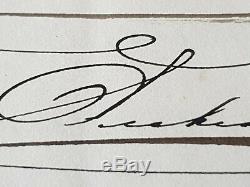
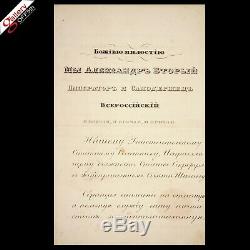
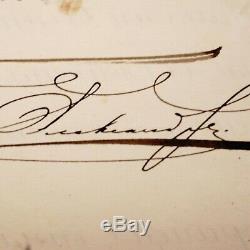
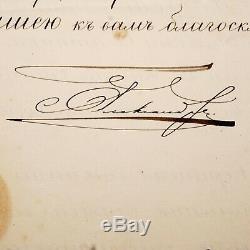
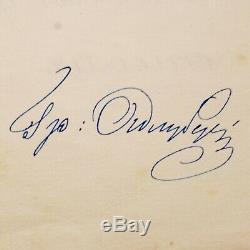
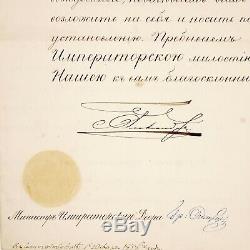
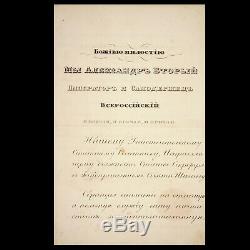
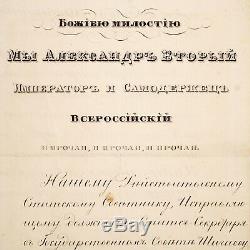
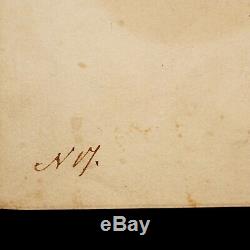
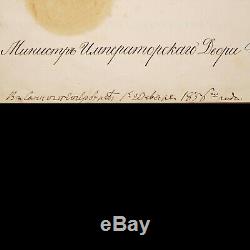
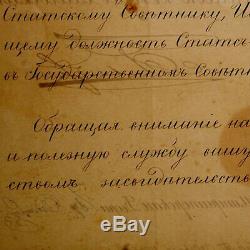
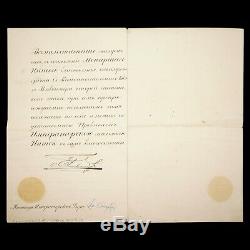

For your consideration is an exceedingly rare and historical authentic hand-signed 1856 Czar Imperial Russian Royalty Tzar Tsar Alexander II Signature Autograph Document Romanov. Alexander II (Russian: 29 April 1818 13 March 1881) was the emperor of Russia from 2 March 1855 until his assassination on 13 March 1881. He was also the king of Poland and the grand duke of Finland.
Alexander's most significant reform as emperor was emancipation of Russia's serfs in 1861, for which he is known as Alexander the Liberator (Russian:). The tsar was responsible for other reforms, including reorganizing the judicial system, setting up elected local judges, abolishing corporal punishment, promoting local self-government through the zemstvo system, imposing universal military service, ending some privileges of the nobility, and promoting university education. After an assassination attempt in 1866, Alexander adopted a somewhat more reactionary stance until his death. He sought peace, moved away from bellicose France when Napoleon III fell in 1871, and in 1872 joined with Germany and Austria in the League of the Three Emperors that stabilized the European situation. Despite his otherwise pacifist foreign policy, he fought a brief war with the Ottoman Empire in 187778, pursued further expansion into Siberia and the Caucasus, and conquered Turkestan.
Although disappointed by the results of the Congress of Berlin in 1878, Alexander abides by that agreement. Among his greatest domestic challenges was an uprising in Poland in 1863, to which he responded by stripping that land of its separate constitution and incorporating it directly into Russia. Alexander was proposing additional parliamentary reforms to counter the rise of nascent revolutionary and anarchistic movements when he was assassinated in 1881.
Born in Moscow, Alexander Nikolaevich was the eldest son of Nicholas I of Russia and Charlotte of Prussia (daughter of Frederick William III of Prussia and of Louise of Mecklenburg-Strelitz). His early life gave little indication of his ultimate potential; until the time of his accession in 1855, aged 37, few[quantify] imagined that posterity would know him for implementing the most challenging reforms undertaken in Russia since the reign of Peter the Great.In the period of his life as heir apparent (1825 to 1855), the intellectual atmosphere of Saint Petersburg did not favour any kind of change: freedom of thought and all forms of private initiative were suppressed vigorously by the order of his father. Personal and official censorship was rife; criticism of the authorities was regarded as a serious offence. The education of the Tsesarevich as future emperor took place under the supervision of the liberal romantic poet and gifted translator Vasily Zhukovsky, [9] grasping a smattering of a great many subjects and becoming familiar with the chief modern European languages.
[8] Alexander's alleged lack of interest in military affairs (as detected by later historians) resulted from his reaction to the effects of the unsavoury Crimean War of 18531856 on his own family and on the whole country. Unusually for the time, the young Alexander was taken on a six-month tour of Russia (1837), visiting 20 provinces in the country. He also visited many prominent Western European countries in 1838 and 1839.As Tsesarevich, Alexander became the first Romanov heir to visit Siberia (1837). While touring Russia, he also befriended the then exiled poet Alexander Herzen and pardoned him.
It was through Herzen's influence that the tsarevich later abolished serfdom in Russia. In 1839, when his parents sent him on a tour of Europe, he met twenty-year-old Queen Victoria and both were enamored of each other. Simon Sebag Montefiore speculates that a small romance emerged. Such a marriage, however, would not work, as Alexander was not a minor prince of Europe and was in line to inherit a throne himself.He has been described as looking like a German, somewhat of a pacifist, a heavy smoker and card player. Encouraged by public opinion, Alexander began a period of radical reforms, including an attempt not to depend on landed aristocracy controlling the poor, an effort to develop Russia's natural resources, and to reform all branches of the administration. He praised Alexander for the range of his fundamental reforms, arguing that the tsar was. Called upon to execute one of the hardest tasks which can confront an autocratic ruler: to completely remodel the enormous state which had been entrusted to his care, to abolish an age-old order founded on slavery, to replace it with civic decency and freedom, to establish justice in a country which it never known the meaning of legality, to redesign the entire administration, to introduce freedom of the press in the context of untrammeled authority, to call new forces to life at every turn and set them on firm legal foundations, to put a repressed and humiliated society on its feet and to give at the chance to flex its muscles. Alexander II succeeded to the throne upon the death of his father in 1855.
As Crown Prince, he had been an enthusiastic supporter of his father's reactionary policies. That is, he always obeyed the autocratic ruler. But now he was the autocratic ruler himself, and fully intended to rule according to what he thought best. He rejected any moves to set up a parliamentary system that would curb his powers. He inherited a large mess that had been wrought by his father's fear of progress during his reign. Many of the other royal families of Europe had also disliked Nicholas I, which extended to distrust of the Romanov dynasty itself. Even so, there was no one more prepared to bring the country around than Alexander II. The first year of his reign was devoted to the prosecution of the Crimean War and, after the fall of Sevastopol, to negotiations for peace led by his trusted counsellor, Prince Alexander Gorchakov. The country had been exhausted and humiliated by the war. Bribe-taking, theft and corruption were rampant. The Emancipation Reform of 1861 abolished serfdom on private estates throughout the Russian Empire. Serfs gained the full rights of free citizens, including rights to marry without having to gain consent, to own property and to own a business.The measure was the first and most important of the liberal reforms made by Alexander II. Polish landed proprietors of the Lithuanian provinces presented a petition hoping that their relations with the serfs might be regulated in a more satisfactory way (meaning in a way more satisfactory for the proprietors).
Alexander II authorized the formation of committees "for ameliorating the condition of the peasants, " and laid down the principles on which the amelioration was to be effected. Without consulting his ordinary advisers, Alexander ordered the Minister of the Interior to send a circular to the provincial governors of European Russia (serfdom was rare in other parts) containing a copy of the instructions forwarded to the Governor-General of Lithuania, praising the supposed generous, patriotic intentions of the Lithuanian landed proprietors, and suggesting that perhaps the landed proprietors of other provinces might express a similar desire.The hint was taken: in all provinces where serfdom existed, emancipation committees were formed. The item "Alexander II Signed TRAR Russia Royal Document Letter Autograph Romanov Russian" is in sale since Tuesday, July 16, 2019. This item is in the category "Collectibles\Historical Memorabilia\Royalty Collectibles".
The seller is "galleryoff5th" and is located in New York, New York. This item can be shipped worldwide.
- Modified Item: Yes
- Country/Region of Manufacture: Russian Federation
- To Commemorate: Appointment / Commission
- Theme: Royalty
- Country: Russia
- Type: Royal Document
- Year: 1856
- Features: Antique
- Vintage: Yes
- Modification Description: Hand-signed by Tsar Alexander II of Russia
- Signed: Yes
- Royal: Tsar Alexander II of Russia
- Royalty: Russia

